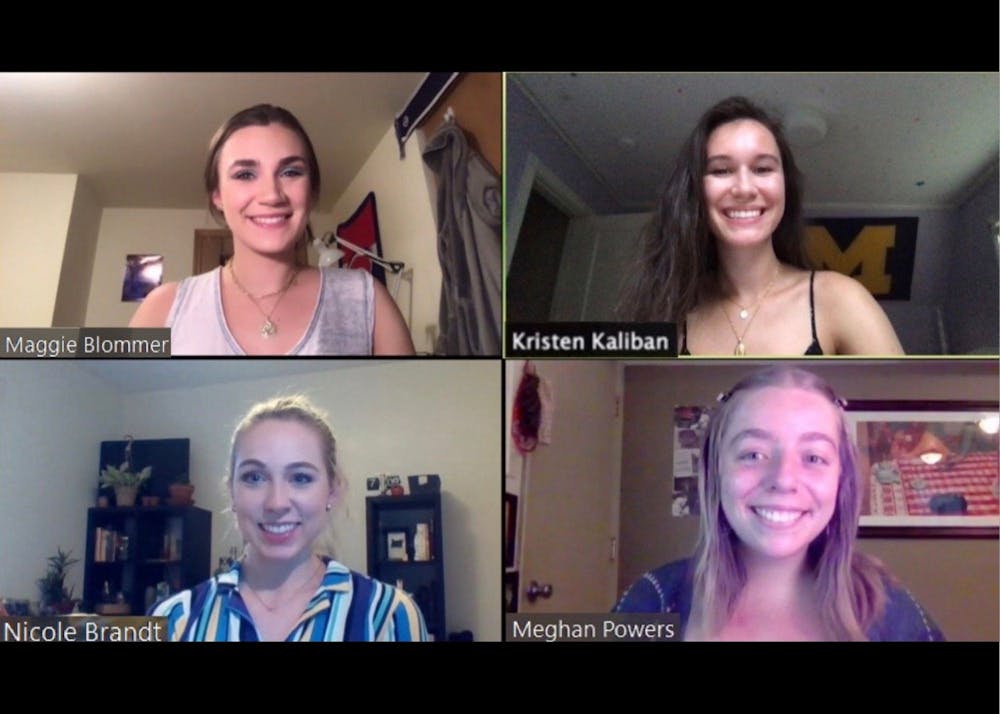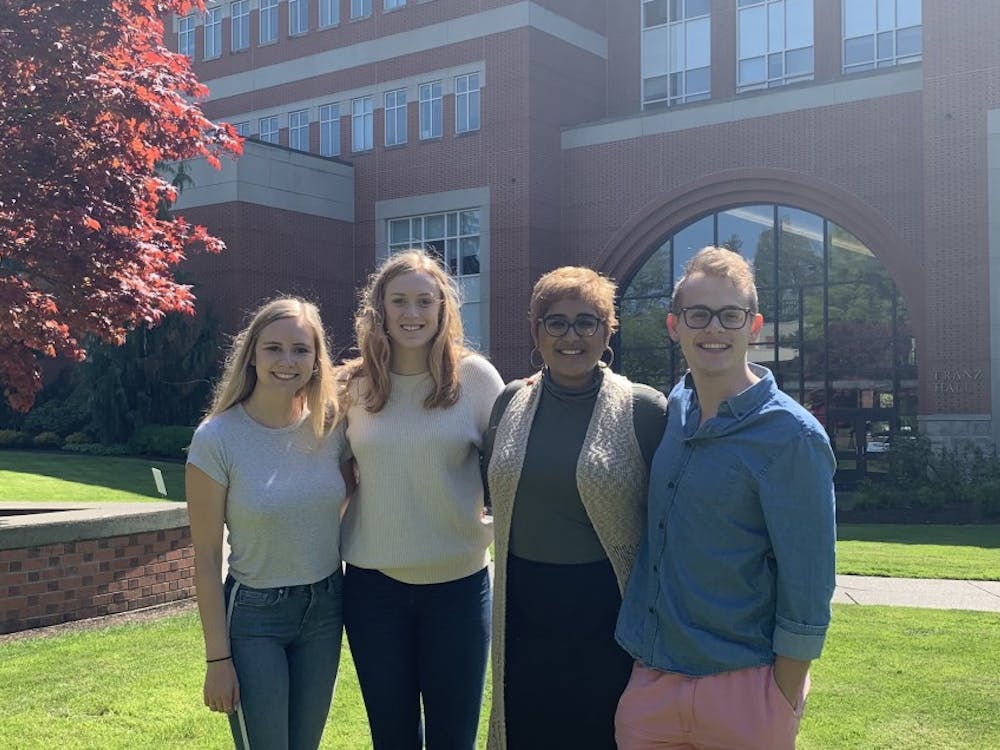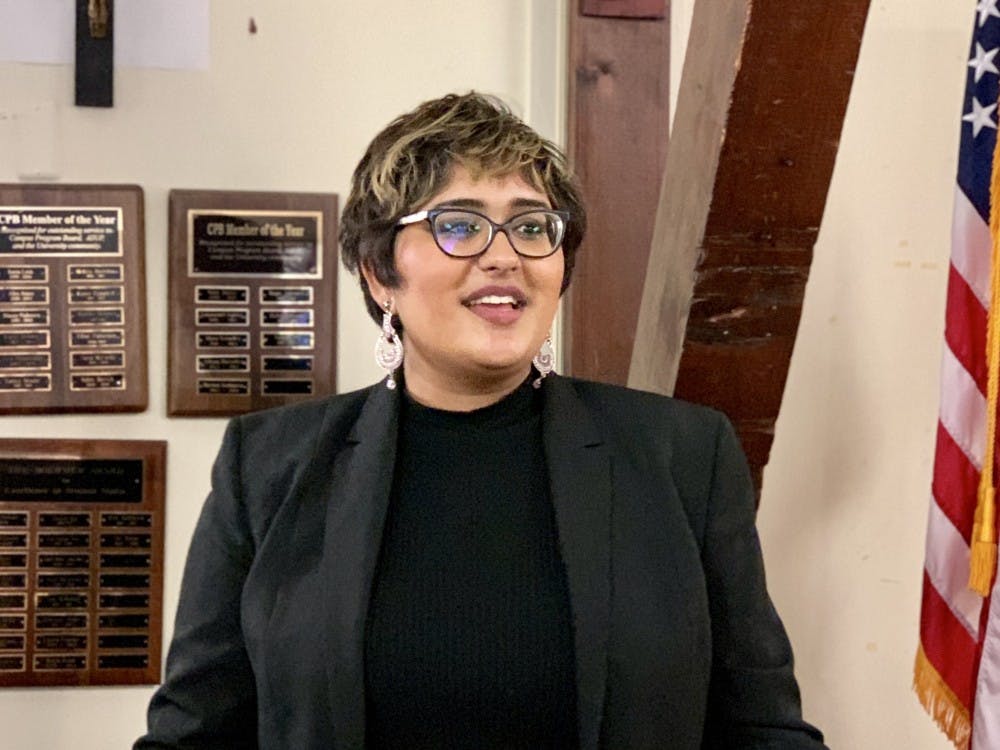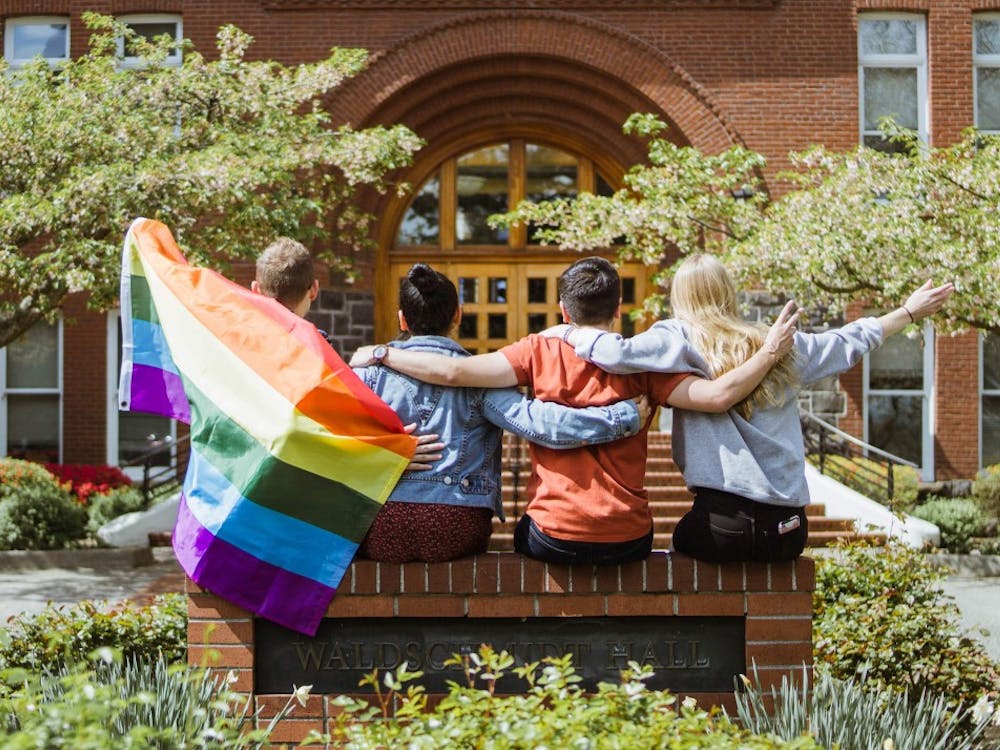** The following Open Letter details our experiences with sexual violence advocacy on this campus. We are aware of the sensitive nature of this subject and recognize that this may be activating for many readers. Please take that into consideration as you read through this article. **
We, the past and present leaders of Students Against Sexual Assault, SASA, believe sexual assault is an issue that has been minimized in the eyes of our administration. We include a call to action in this letter for our administration and our Title IX committee, in hopes that we can stimulate a campus wide cultural change regarding the ways sexual assault is talked about, viewed and dealt with on our campus. While we have had many positive and hopeful collaborations with key administrators, we have also felt deeply frustrated and angered by the lack of meaningful progress which has been highlighted again in recent weeks through a tone-deaf survey question.
To Hell with Good Intentions
Throughout the history of social justice work it has been emphasized that good intentions accompanied with a lack of concrete change or action can be more damaging than no good intentions at all. The University of Portland serves as a fine example of this. Their ‘good intentions’ with regards to education, prevention, and recovery for survivors of sexual assault, coupled with a lack of concrete action, must be discussed by our broader UP community. The University’s lack of action has resulted in a culture of complacency and, therefore, neglect towards sexual violence on our campus.
Student leaders began discussing putting together this letter after seeing a recent survey question on this year’s required sexual assault and alcohol training titled “Get Inclusive Voices of Change.” We would like to recognize that while the University did not write this training, they did administer it to thousands of students. We also want to recognize that the University’s Title IX team made a statement on Instagram addressing and apologizing for administering this question. However, that does not dismiss the years of frustration concerning Title IX on our campus.
The question which resulted in rightful student outrage reads, “A person who is drunk might rape someone unintentionally.” It then asks students to rate this statement between a 1, strongly disagree, and a 5, strongly agree. The major issue with this question is that the wording alludes to the possibility that rape can be unintentional.
Rape should never be viewed as an unintentional act
We want to put this in perspective with an example. When someone is caught drunk driving, they are almost always prosecuted to the fullest extent; there is no question whether this action was intentional. Why would we look at an instance of sexual assault as any different? Why do we feel the need to question the validity of the situation when it comes to the violation of another's body?
SASA believes survivors, we support survivors, and we understand the retraumatization that a question like this could elicit. Like many others at UP, we too were disgusted, triggered, and infuriated reading this question on the yearly survey. Behavior like this can no longer go undiscussed, unexamined, and uncriticized at our university.
On-Campus Third-Party Confidential Advocate
This harmful survey question is simply the straw that broke the camel’s back. SASA has long been frustrated and appalled by the lack of transparency in the Title IX process and the University’s haste to dismiss structural changes proposed by SASA.
Since SASA’s formation, we have been pushing for the implementation of a confidential advocate program, specifically a confidential, third-party advocate that is housed on our campus, but not affiliated with our university in any capacity. Many universities of all sizes and religious affiliations throughout the US have incorporated confidential advocate programs, as they are seen as ‘best practice’ and crucial to supporting survivors of interpersonal violence.
One successful example is Gonzaga University in Spokane, Washington, a fellow Catholic institution. Gonzaga’s Title IX program partnered with the Lutheran Community Services Northwest (LCSNW), a non-profit with locations in Washington, Idaho and Oregon. They work with their community’s specific needs by working with individuals, families, and groups aligned with health, justice, and hope. Gonzaga’s partnership with the LCSNW has provided its students with a trained, third-party, non-university affiliated resource on their campus. They can access this resource through a student-specific phone number to set up a time to talk and get help. This advocate is primarily funded through the LCSNW, although Gonazaga has allocated a small amount of money toward this program as well. If a third-party program like this were to be present on the University of Portland’s campus, the primary need from the university would be an office to house this advocate in. Looking at Gonzaga and other universities who have implemented systems like this, it seems unreasonable that we, the University of Portland, are unable to do the same.
A third-party advocate would provide survivors at UP with resources, support, and information about options in the aftermath of sexual violence. Additionally, a third-party advocate would be unaffiliated with UP, which is important for survivors of sexual violence who may find it challenging to trust an institution that has failed its students, faculty and staff countless times.
However, the hours of research and the numerous meetings regarding this implementation have resulted in no change. Title IX has pushed back or turned down this proposal time and time again, stating, “if the reporting party has a confidential advocate, then so should the responding party”. Survivors on our campus currently have no resources to turn to that are not in some way affiliated with the university, and this void needs to be filled.
Current Confidential Resources on campus and why they are not enough
This leads us to the current confidential resources provided by the University of Portland. SASA does not believe any of these options are inclusive of all students, or best practice. Listed below are the four current confidential resources and reasoning for why we believe a third-party confidential advocate must be added to our campus.
The first group defined as confidential advocates on campus include priests or members of campus ministry, which is a very uncomfortable option for many students. Although we are a religious institution, only about half of our students identify as Catholic, and only about half of that population is practicing, a statistic stated on every campus tour for potential students. Although this option may be suitable for some students, it is not the most inclusive option to have as one of our sole confidential resources on campus.
The second confidential resource option on campus is the Health and Counseling Center (HCC). Within the past few months, the VP of Student Affairs gave recommendations to the Budget Working Group to furlough specific staff members of the HCC because of budget cuts due to the pandemic. This causes worry about the amount of staff that is currently available to support students. Historically, the HCC also has had a long wait time when scheduling counseling sessions, though it is quick to advertise that they keep appointment spots open daily for emergencies. However, survivors were often referred to off-campus resources, which again highlights the issue of on-campus accessibility for all students.
The third option, and in our opinion the most reliable, is a group of program counselors who took steps to become confidential advocates. These steps included a singular half-day training provided by Matt Rygg and Meg Farra, members of the Title IX board, and an optional training we will link here. We first would like to say that we applaud and deeply value the program counselors and members of Campus Ministry who took time out of their busy lives to participate in this training and become confidential resources. However, this option has been very underpublicized, being found only on the Title IX website. Another issue with this resource is that students may still be deterred from reaching out since these advocates are still affiliated with the university.
The final service that our university references as a free confidential resource is the Victims Rights Law Center (VRLC). However, after looking into the VRLC’s provided services and outreach, it appears that this amazing organization has no specific individual relationship with the University of Portland. This service is free to anyone in the state of Oregon with branches all over the United States. If student survivors do desire legal help, we highly recommend contacting the VRLC. However, legal help is not always the first step in a survivor's journey to recovery. Therefore, this resource is not a good fit for many survivors who are not seeking legal advice. Title IX also made it clear that the university would provide transportation to this service since it is located off campus. This then brings up the issue of accessibility for students who may not feel comfortable being driven by a member of the University of Portland community to such a personal meeting, and fails to rectify the issue of eliminating University involvement.
These four services are the extent of the University’s current confidential resources outside of Title IX. All of these programs have major flaws relating primarily to university affiliation. The lack of a third-party confidential advocate shows that the university is failing to implement a mundane and long-overdue initiative that could help survivors on its campus. The reality is that the healing and well-being of survivors is not currently being prioritized by University of Portland’s leadership.
Student View of Title IX
This leads us to the general student view of Title IX and the way that the University of Portland deals with allegations of sexual violence. SASA deeply values confidentiality, and thus never discloses names, stories, or details. The following will include only numerical accounts.
Since the formation of SASA in 2016, past and present SASA board members can recall at least 60 instances of survivors coming to us asking questions along the following lines: “Is it worth taking my situation to Title IX?,” “Will Title IX believe me?,” “I have heard Title IX victim-blames students who come to them, will they do this to me?,” “Will I have to see, talk to or interact with my assaulter if I take the case to Title IX?” Survivors also often ask if they have to move forward with their case once they talk to Title IX. Many survivors just want to have someone to talk to about the situation before considering further action.
These kinds of questions were asked repeatedly by survivors who have come to SASA board members when deciding if they want to engage with Title IX. This shows the general student view of Title IX rooted in distrust, fear, and concern that the process lacks empathy and compassion. Survivors are afraid they will be retraumatized by Title IX since other students at our university have come forward with their negative Title IX experiences.
This reality is contrary to the function of Title IX, which is to be a resource for survivors of interpersonal violence so they as individuals, and our community at large, can feel safe, respected, and cared for by our university and on our campus. This necessitates high levels of empathy, compassion and understanding—all characteristics that most University of Portland students do not associate with our Title IX program.
Title IX has repeatedly stated to SASA and others who seek their counsel that they dislike publicizing discourse and negative feedback, claiming that it deters other survivors from reaching out to them. However, considering the mass amount of survivors who have already hesitated to speak to Title IX due to our student body’s current general mistrust, we do not feel that public criticism is the main reason survivors hesitate to go to Title IX; it’s the relationship Title IX has built with the student body through their own doing. It is vital that Title IX not only recognizes the reform needed within their own program, but also that they acknowledge how their past actions (and lack thereof) have created an atmosphere of mistrust and disapproval between themselves and the community they are supposed to serve.
A Lack of Change
We acknowledge that the University functions on a long term level and looks to make long term changes. We are also aware that change doesn’t always happen over a year, or even two years. However, current SASA co-President Meghan Powers has sat at the table with Title IX for three years and has heard good intention after good intention stated, but those intentions have rarely, if ever, been followed by solid action.
We would like to recall the 2019 Beacon Opinion piece titled “A Call for Institutional Reform” written by former SASA co-Presidents Emma Covert and Shelby Gavigan as well as former ASUP President Sitara Nath and Vice President Michael Gallagher.
An excerpt from the opinion piece reads, “Overall, the lack of transparency within and general length of the Title IX process is problematic. There are many students who have gone through some version of the Title IX process this year that speak about the traumatization, betrayal, lack of empathy and support they have felt while attempting to find justice in the aftermath of interpersonal violence. These stories are sadly not the exception and are not ours to share, however they expose some troubling trends...What is clear is that we’ve created conditions where community members are continuing to be victimized and do not trust that the process will hold anyone accountable—we allow and tolerate a culture that perpetuates violence.”
Looking back at this piece, it is infuriating that these problems rang true on our campus in the spring of 2019. It is just as infuriating that a year and a half later these problems are still prevalent. The triggering question on this year’s sexual assault and alcohol training survey shows that the University still has a major lack of understanding when it comes to supporting survivors.
SASA’s Call to Action for Title IX
Ideally, anytime a student at UP experiences sexual violence, SASA would, in good faith, recommend that the situation be reported to Title IX. However, we are currently unable to, in good conscience, advocate for Title IX as a consistent avenue for justice and healing when most survivors have reported Title IX is retraumatizing, brash, and rife with victim-blaming. It is clear that Title IX is primarily focused on protecting the institution from reputational harm above all else. Their failures in this capacity results in the retraumatization of survivors leading other students to feel an uncertainty around reporting to Title IX. This is not acceptable nor what we believe Title IX wants. Title IX needs to be a safe place survivors can turn to.
Time and time again, students have called for action within Title IX to create a safer community for students; but these repeated calls are ignored, brushed over or supposedly ‘solved’ with cosmetic fixes. We will no longer be complicit in a system that discredits survivors and enables perpetrators.
The following are our current calls to action:
-
We call on the University of Portland to commit to providing a third-party confidential-advocate on our campus by the fall of 2021. This includes finding a space on campus, identifying a local organization to work with and providing a third-party advocate for survivors of sexual violence in our university community. SASA will heavily help in this process, but the University and Title IX need to commit to implementing this on our campus.
We call for a cultural change within UP’s community that stops the perpetuation of sexual violence, victim blaming, and attitudes/beliefs that uphold this culture of complacency. This cultural change has to start at an administrative level. This does not stop at allocating funding or improving important resources on campus for survivors, but all administrators, pastoral community leaders, and instructors need to be a part of this necessary change. To do this, we will start by implementing town halls twice a semester that students can attend, as well as required attendance for key administrators to hear the student voice and outcry on the issue of sexual violence on our campus. We plan to hold the first townhall meeting during SASA’s annual fall week of action, a week in October dedicated to sexual assault prevention and education.
SASA Moving Forward
To end this opinion piece, SASA wants to highlight our plan moving forward. We are currently a student organization that ‘lives’ in the Health and Counseling Center. We are appreciative for the support from the HCC these past few years, but we believe it has made us less accessible for student involvement. That being said, this school year, with the support of ASUP and the Gender and Women’s Studies program, we are planning on transitioning to an on campus club rather than a campus organization. We believe being a club with independent funding and decision-making abilities will enable us to create a deeper connection with the student body.
We will still be heavily involved in conversations and collaboration with Title IX. We ensure that we will continue to hold a seat at the table with Title IX in order to enact legitimate concrete change. We know that change cannot be made if student voices are not heard. We want to ensure that the student voice will be vocalized louder than ever before. SASA strives to create a community of care on our campus where the first touch point for survivors is an easily accessible, third party confidential resource whose only concern is the advocacy, safety, and healing of survivors. SASA wants to work with Title IX to attain a legitimate and cultural change on campus regarding the current student view and actions of TItle IX. It is obvious that change on our campus regarding the rhetoric and dealings with sexual violence is necessary. So let’s finally commit to this long overdue change.
We believe you. We support you. Always.
Sincerely,
SASA co-Presidents Meghan Powers and Kristen Kaliban and SASA General Board Members Maggie Blommer and Nicole Brandt.
This letter was also in collaboration with former, now graduated, SASA Presidents: Kim Dorr, class of 2020, Shelby Gavigan and Emma Covert, Class of 2019, and Co-Founders Abby Sherman and Maddie Hansen, Class of 2018.
This letter is endorsed by the following clubs and organizations on campus: Active Minds, ASUP, Black Student Union, Feminist Discussion Group, Gender & Sexuality Partnership, International Student Union, Jewish Student Union, Latinx Student Union, and Womxn of Color.
Senior Meghan Powers and sophomore Kristen Kaliban are the co-presidents of SASA. They can be reached at powersm21@up.edu and kaliban23@up.edu respectively. Junior Maggie Blommer and senior Nicole Brandt are SASA general board members. They can be reached at blommer22@up.edu and brandt21@up.edu respectively.
Have something to say about this? We're dedicated to publishing a wide variety of viewpoints and we'd like to hear from you. Voice your opinion in The Beacon.








